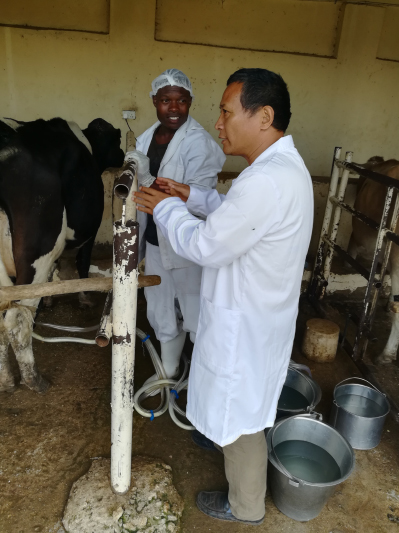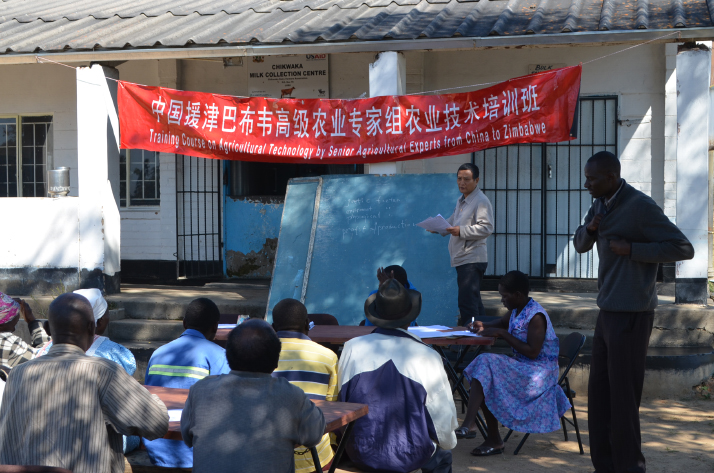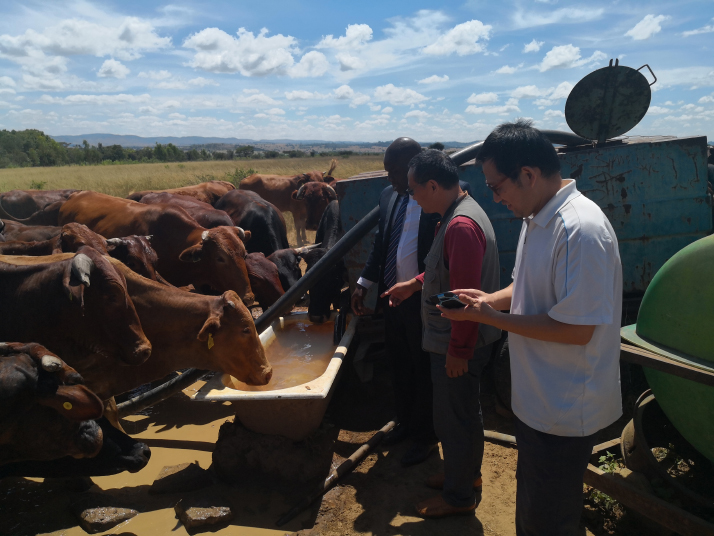|
||||||||||
| Home Nation World Business Opinion Lifestyle ChinAfrica Multimedia Columnists Documents Special Reports |
|
||||||||||
| Home Nation World Business Opinion Lifestyle ChinAfrica Multimedia Columnists Documents Special Reports |
| ChinAfrica |
| A Chinese expert helps Zimbabwean farmers raise output |
| During his stay in Zimbabwe, Li pledged to share China's experience in livestock farming with local farmers. With the help of his fellow members of the expert group, he carried out technical training, field demonstrations and research work in accordance with the agricultural cooperation project between the two countries |
| By Li Jing VOL.13 June ·2020-06-08 |

As a member of the second Chinese agricultural expert mission to Zimbabwe, Li set foot on the African soil for the first time in October 2015. After the mission came to a close three years later, Li decided to stay back in Zimbabwe. He joined the third Chinese mission for another three years.
"When I was young, I applied several times to take part in Sino-African agricultural cooperation projects, and now my wish has finally come true. It's a great joy for me to learn about Africa and promote Chinese agricultural experiences," Li told ChinAfrica.
During his stay in Zimbabwe, Li pledged to share China's experience in livestock farming with local farmers. With the help of his fellow members of the expert group, he carried out technical training, field demonstrations and research work in accordance with the agricultural cooperation project between the two countries.

Over the past five years, Li has learned to adapt well to life in Zimbabwe and fallen in love with the country. "The most attractive thing here is the pleasant climate, the blue sky, the green grass and the fresh air. All of this is suitable not only for agricultural production, but also for the inhabitants," he said.
Li quickly discovered that Africa is different from what he had imagined before coming here. Beyond the pleasant climate, cities are also developing rapidly. In Zimbabwe's capital Harare, high-rise buildings, cafes and luxury cars can be seen everywhere, and the living conditions of local residents are enviable.
"Although local natural conditions are well suited to the development of agriculture and animal husbandry, there is still a great shortfall in meeting the domestic demand. For example, the annual demand for milk in Zimbabwe is 120 million liters, but last year's milk production was only 75 million liters, which shows the great potential for livestock development in the country," he said.
Li also found that low grain production in Zimbabwe was responsible for the higher prices of animal feed. Nevertheless, the country has vast meadows of natural grass. An interesting path to explore, therefore, would be to focus on herbivorous livestock. In addition, livestock development is unevenly distributed across the country. Large livestock companies have advanced production equipment and high production scale, but this is not the case with the majority of small farmers. Providing them with adequate support is another avenue for livestock industry growth in Zimbabwe.

Exchanges and sharing
"Our main task is to share advanced agricultural technologies with local technicians and farmers, in order to increase agricultural productivity in Zimbabwe," said Li.
The third Chinese mission is made up of 10 agricultural experts, covering fields such as animal husbandry, veterinary medicine, horticulture, aquaculture and agricultural machinery. To carry out its work in a targeted and efficient manner, the group has set up a number of demonstration projects according to the experts' lines of specialty. Li, for his part, is responsible for the rabbit farming project.
In coordination with the Zimbabwean Ministry of Lands, Agriculture, Water, Climate and Rural Resettlement, the project first selected 10 small-scale breeder households and gave them five female and one male rabbit for free. About six months later, each household had to give back four to six rabbits, depending on the breeding conditions. The animals are then given to a new household and the cycle continues. So far, 50 breeders have taken part in the project. The stock of 60 rabbits originally given by the expert group has grown to more than 2,000 in total, generating an annual income of $200-$500 per household.
"Rabbits are herbivorous animals that don't need a lot of refined fodder and are able to reproduce quickly. This project is not only adapted to local natural conditions in Zimbabwe, its short cycle can also raise the standard of living of the stockbreeders and effectively address food security among farmers." Li said, adding that he and his Chinese colleagues often visit farmers' homes and provide technical consultations, organize training and even donate farming equipment to some poor families, such as rabbit cages.
"Knowledge enhances productivity, and targeted technical training is an effective way to increase local productivity." To this end, Li has also been put in charge of providing technical training to agricultural technicians, farmers and students from agricultural colleges. As of today, he has shared several new agricultural techniques with around 450 local people.
Up to now, the Chinese expert group has provided equipment worth around 1 million yuan ($141,000) to local partners, including incubators, fodder mixers and milking machines, which has considerably improved the productivity of local farmers.
Li said data shows that the number of cattle and volume of milk production are steadily increasing in the country. Zimbabwe's milk production in 2019 registered an increase of 13.6 percent over the previous year.
In August 2017, Li received an award for his outstanding contribution from the Zimbabwean Ministry of Lands, Agriculture, Water, Climate and Rural Resettlement.
Long-term development
"Improving management plays an important role in increasing agricultural productivity," Li said, adding that he and his Chinese colleagues often conduct local seminars on agricultural production and management detailing the Chinese agricultural management system. They also conduct field research in order to provide better counselling and advice to local farmers. Li has also written a number of research papers, including one on the impact of financial policies on agricultural production.
Taking pride in the many successes they have achieved for Zimbabwean livestock industry development since their arrival, Li and his Chinese colleagues are all aware of the difficult issues that need to be resolved in the future, such as lack of funds and insufficient agricultural infrastructure.
"Our strength is limited, but we must continue to support small farmers in Zimbabwe through our technical advice and equipment, so that they can help more people in turn, thus benefiting the whole society," said Li.
(Print Edition Title: Raising Productivity)
Comments to lijing@chinafrica.cn
| About Us | Contact Us | Advertise with Us | Subscribe |
| Copyright Beijing Review All rights reserved 京ICP备08005356号-5 京公网安备110102005860号 |